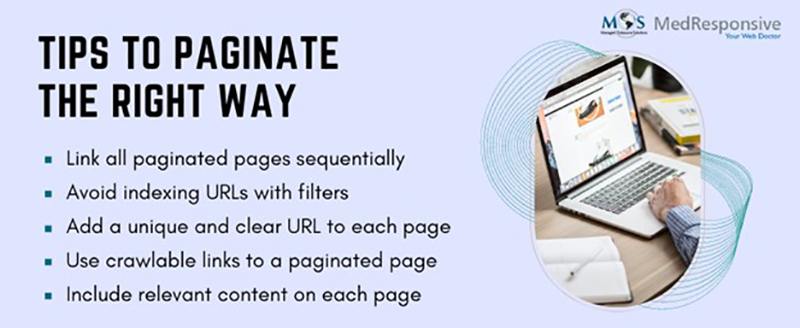Our last blog – Pagination in SEO – Its Best Practices discussed Google’s official documentation that it no longer uses rel=”next” and rel=”prev” as an indexing signal.
Let us look at some common pagination SEO issues and some best practices to get pagination done right. Pagination is all about dividing content across a series of pages. Rely on professional content writing services to avoid duplicate content issues.
Does Pagination Impact SEO?
Pagination can have both positive and negative effects on Search Engine Optimization (SEO). When it comes to the advantages of pagination, it can
- Increase page loading speed
- Improve page navigation, and
- Boost user engagement rate
The following are some ways in which pagination can impact SEO:
Duplicate content
This is a concern, if pagination has been improperly implemented, such as having both a “View All” page and paginated pages without a correct rel=canonical. SEO-friendly pagination will not create duplicate content, mainly because the paginated pages will contain different content linked to the other pages in the sequence. The actual page content can differ, even if your H1 and meta tags are the same. Problem occurs when the same content is displayed on multiple pages, causing search engines to view it as duplicate content. To avoid this, it is important to implement proper canonicalization techniques.
Thin Content
In some cases, pagination can contribute to thin content, mainly because you have divided a large amount of content into smaller, less substantial pages. This may leave too little content on each page. Thin content can negatively impact search rankings and on-site user experience. To avoid this SEO issue, put a UX-friendly amount of content on each page.
Dilutes Ranking Signals
The number of high-authority domains that link to that site matters, as the more pages that a website contains, the more links it needs to impact ranking signals. When a web page is linked to from multiple pages, the link equity is divided among those pages, which can dilute the overall strength of the links.
This concern can be prevented by using pagination only in cases where a single-page content approach would cause poor UX. Even on such pages, check out ways to reduce the number of paginated pages.
Uses Crawl Budget
Crawl budget refers to the number of pages that a search engine crawler visits when assessing and ranking content in a given day. If Googlebot indexes all the paginated URLs to reach deeper content pages, it can impact your crawl budget.
To conserve crawl budget for more important pages, it is ideal to set Google Search Console pagination parameter handling to “Do not crawl” or set a robots.txt disallow.
To optimize your crawl budget, Neil Patel recommends focusing on getting more quality links to your pages, keeping a clean site structure with few redirects, reducing the amount of load time for each page by minifying JavaScript and CSS files, and compressing images where possible, and addressing any 404 errors so that bots don’t waste time trying to access pages
How to Implement Pagination for SEO?
- Use keywords on subpages as anchor text that links back to top-level pages
- Optimize the content on paginated pages
- Use the right keywords strategically
- Add the right alt-text to images
- Include useful, relevant content on each page
- Avoid including paginated pages in XML sitemaps
- Use crawlable anchor links with href attributes
Above all, Search Engine Journal recommends blocking pagination crawling by –
- adding nofollow to links that point towards paginated pages
- using a robots.txt disallow, or
- setting paginated page parameter to “Paginates” and for Google to crawl “No URLs” in Google Search Console

It is important to implement pagination effectively to ensure that it does not negatively impact the website’s ranking and visibility in search results. Experienced digital marketing outsourcing companies can handle pagination and other SEO strategies quite well to enhance page rankings and boost conversion rates.
At MedResponsive, our team is up-to-date with changing SEO standards and algorithms. Discuss your digital marketing requirement with us at (800) 941-5527. Schedule a FREE consultation with our senior solutions manager and find out more about our services.




